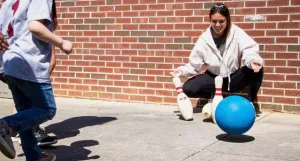Originally published Aug. 1, 2022 by The Daily Times.
By Amy Beth Miller
Maryville College students delivered physical education lessons at Foothills Elementary School last semester, but both groups learned from the experience.
Community-engaged learning is a win-win for college students and their partners off campus, according to Jeremey Steeves, associate professor of exercise science.
 The 21 students in his Physical Education and Recreation for Special Populations class, a requirement for MC students earning a physical education license, worked with nine students in the Comprehensive Development Classroom at Foothills Elementary School, bringing not only lessons but also a high level of individualized attention for students.
The 21 students in his Physical Education and Recreation for Special Populations class, a requirement for MC students earning a physical education license, worked with nine students in the Comprehensive Development Classroom at Foothills Elementary School, bringing not only lessons but also a high level of individualized attention for students.
They worked with Foothills special education teacher Amanda Waters, whose students have a range of physical, medical, emotional and behavioral disabilities, developmental delays, autism, speech and/or language impairments, Down Syndrome, attention deficits and other conditions.
In previous years special needs students from Eagleton Elementary School road a bus to Maryville College’s Cooper Athletic Center once a week, but when Steeves began teaching the college course in spring 2021 his students had to work over Zoom with children from Foothills and John Sevier Elementary because of the pandemic.
This April the college students traveled to Foothills twice a week for 40-minute classes and then developed a Special Olympics event.
“That was the highlight of their week; they looked forward to going,” Steeves said of his students.
Some college students had not previously had much interaction with people with disabilities, but the teacher they worked with at Foothills comes from a family of special educators.
“My aunt was a K-3 special education teacher, and my grandmother was a special education teaching assistant at the intermediate school level,” Amanda Waters explained in emailed responses to questions from The Daily Times. “I learned so much about teaching special populations from my aunt, and I spent a lot of time in her classroom learning from her and working with her students. There was something special about the individualized goal-setting and interventions my aunt developed and implemented in her classroom and the multidisciplinary team collaboration that supported students reaching and exceeding their goals. I was inspired by the close relationships my aunt developed with her students and their families, and I decided that I wanted to pursue a teaching career like hers.”
“Over the next several years, I jumped at every opportunity to learn from, volunteer with, teach and coach individuals with disabilities, and the relationships that I formed with the kids I served reinforced my decision to teach neurodiverse students,” said Waters, who earned a bachelor’s and a master’s degree in special education from the University of Tennessee.”
The Maryville College students developed lessons based on SHAPE America’s national standards for K-12 physical education to develop physically literate individuals, capable of playing or competing in sports. Those standards include elements such as balance, agility, flexibility, strength, endurance, the ability to manipulate a object and the ability to skip, hop, run and gallop.
The lessons needed to be inclusive, with opportunities to engage all students, so they were adaptable. For example, when students are kicking at a target the leader can alter the size of the target, the size of the ball, the distance, the number of atempts and other elements. The college students also learned techniques for engaging students and keeping their attention on the tasks.
“More often than not, providing accommodations that support one student will indirectly support multiple students,” Waters said, giving examples such as providing explicit directions, using simple language, setting clear expectations, modeling actions and allowing breaks. “Planned supports and accommodations for specific students ultimately benefited the entire group.”
Steeve evaluated the lesson plans first, and then his students practiced teaching their classmates at Maryville College before going to the elementary school.
“Having to teach their own lesson to their peers often times was more intimidating than having to lead that same lesson to a younger peer group of special needs students they had been working with,” Steeves said.
“Most of them haven’t taught before,” Steeves noted, and throughout the class, “they were provided feedback and they had to reflect on what they could do differently, what they could do better.”
Waters saw the college students’ confidence grow in their interactions with students with complex needs, and in their ability to deliver fast paced, differentiated instruction.
“They developed relationships with my students, and they began to use their knowledge of my students to inform their instructional planning,” she said. “By the end of their time with my students, they demonstrated thoughtful planning and responsive teaching practices informed by students’ interests and needs to support and engage ALL learners.”
As part of the class the college students created a 24-page booklet for coordinating a Special Olympics day with 24 possible activities or stations. They then chose half a dozen or so for a day at Foothills that included included team relays, throwing at targets, T-ball, rolling balls, following “Simon says” directions and more.
Funding for some small equipment donated to the Foothills class, pizza for after the Special Olympics activities and T-shirts for the Foothills Elementary students came through the Bonner Community-Engaged Learning Initiative Faculty Cohort. All of the students’ shirts showed they were No. 1.
The Maryville College students had planned to volunteer at the countywide Special Olympics event this spring too, but because of schedule changes only Steeves was able to be there.
“We’re all better when we can better understand others that are not typical of ourselves, when we can appreciate diversity, when we experience diversity,” Steeves said. “Before working with this class I was more limited in my appreciation for that diversity.”
Waters said, “Educators hold a tremendous responsibility to design instruction that effectively supports and engages all students at all ability levels. This MC course and partnership provides future educators and service providers the opportunity to learn about, design and implement differentiated instruction, with real student interests, abilities and needs in mind.”


